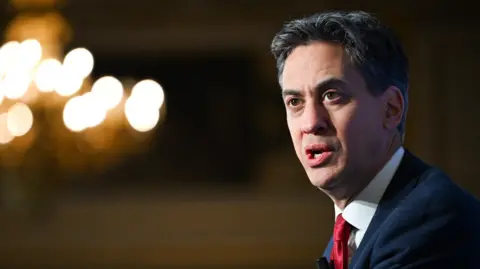In recent political discourse, Energy Secretary Ed Miliband has taken a firm stand in defense of Chancellor Rachel Reeves, particularly regarding the contentious decision surrounding winter fuel payments. Miliband addressed the public through a BBC interview, highlighting the rationale behind the Chancellor’s initial move to withdraw this financial support from over ten million pensioners last year. He emphasized that the government had to make difficult choices in order to stabilize the economy, a situation that necessitated painful cuts. Nonetheless, he noted that these decisions ultimately led to increased fiscal flexibility, allowing for a reintroduction of the support system this coming winter.
Miliband stressed that even though the original cut was a challenging step, it paved the way for reopening winter fuel payment eligibility to a larger demographic this season. The Chancellor’s prior decisions were designed to manage the government’s financial interests and alleviate potential economic downturns. Furthermore, Miliband asserted that the expanded support would incur minimal expenses, indicating it would fit within the broader framework of the Chancellor’s upcoming Budget announcement.
Despite the government’s attempt to mitigate backlash from the public and different stakeholders, the Conservative Party has raised concerns regarding the lack of transparent funding mechanisms for the newly proposed benefits. They questioned the Labour administration’s understanding of the financial implications, citing that such decisions must be substantiated by concrete fiscal plans. This argument has resonated with some analysts who view the expansion of benefit programs as potentially leading to overdue financial complications.
The previous decision to revoke the winter fuel payment, which amounted to £300 annually, drew widespread criticism. Previously, this support had been available to a broader range of pensioners, but the government’s new criteria restricted eligibility to only those receiving pension credit or other means-tested benefits, effectively sidelining a significant proportion of the elderly population. Faced with mounting pressure from charities and unions, the Labour government conceded partially, announcing changes that broadened eligibility to over three-quarters of pensioners this winter.
Under the revised guidelines, nine million pensioners in England and Wales with an annual income of £35,000 or below will now qualify for the winter fuel payment. While this move prompted approval from some, it also garnished critique, particularly regarding the designated funding sources. Critics have voiced skepticism about the government’s claim that the adjustment would not lead to permanent deficits, citing fluctuating economic growth rates as potential precursors to future financial instability.
Miliband faced inquiries about whether the Chancellor would issue an apology for the earlier decision to cut payments, responding that these choices stemmed from urgent economic necessities rather than a failure of intent. He reassured that the government remained committed to ensuring that only those who were not financially in need would be excluded from receiving benefits, arguing it remains fairer to limit payments to the neediest demographics.
Nonetheless, the Conservative Shadow Chancellor, Mel Stride, criticized the government, lamenting that it had previously neglected the needs of pensioners during a particularly harsh winter. He accused Labour of mismanaging funds, suggesting they diverted resources intended for pensioner support towards other expenditures. Liberal Democrat leader Sir Ed Davey echoed similar concerns, noting that many pensioners were left in dire situations, often forced to prioritize between basic necessities such as heating and food.
Amidst this charged environment, economic experts have weighed in, providing analytical perspectives on the governments’ decisions. Paul Johnson, head of the Institute for Fiscal Studies, remarked that targeting winter fuel payments may not be the most effective use of public funds, given that many of those receiving support are not classified as impoverished. He indicated that addressing child poverty might be a more significant concern where financial resources would yield greater impact.
The Resolution Foundation also joined the debate, highlighting that the policy revisions could lead to complications in the tax administration system. They argued that the cost associated with implementing means-testing for the expanded winter fuel payments could potentially outweigh any intended financial benefits. Nevertheless, the government assured that the receipt of payments would be streamlined, with provisions in place for pensioners wishing to opt out, potentially alleviating some administrative burdens.
The ongoing conversation around the winter fuel payment highlights broader issues related to economic strategy, welfare eligibility, and the balance of financial accountability within the government. With the autumn budget on the horizon, many eagerly await a clearer financial outline from the Labour administration regarding how these changes will be funded and their implications for the future stability of public finance.



